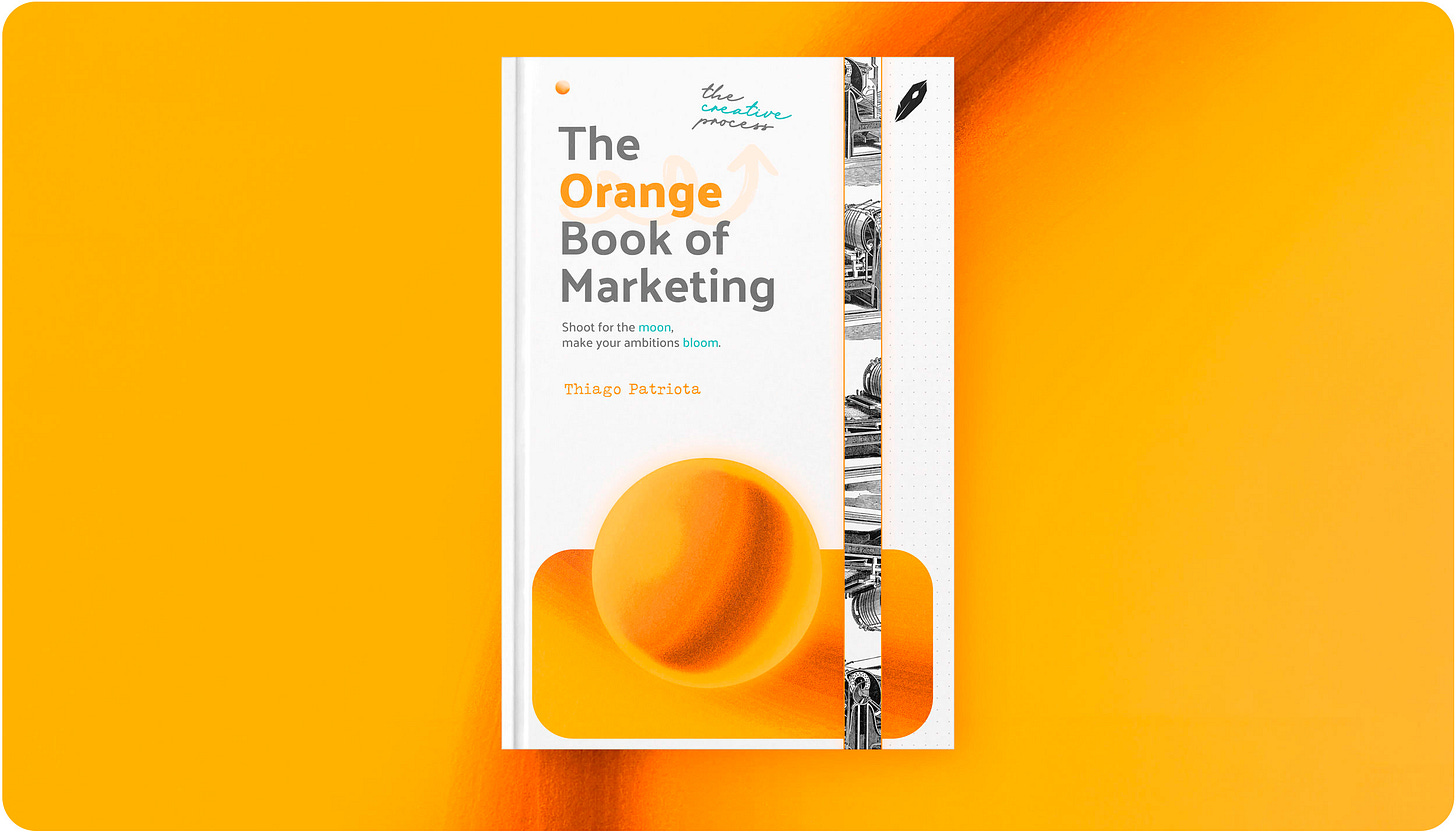TOBM.9 - Picasso's Napkin
The best designers are artists.
Welcome to the ninth edition of TOBM!
In this editorial, we will be sharing previews and full chapters of The Orange Book of Marketing with some commentaries and highlights.
Learn more about the book by clicking this link.
IX - Picasso's Napkin
There's a saying by Tobias Vans Schneider, the lead designer of the NASA's Mars mission brand, that goes like this: "Not all designers are artists. In fact, most designers aren't artists, and that's perfectly fine. But the best designers are indeed artists.". Picasso's Napkin story is about the true price of creativity and how it directly relates to your self-worth as a creative professional.
Picasso had one particular thing in common with some of us. He liked coffee. Hey, are you drinking some coffee now? That is very Picasso of you.
Due to that, he used to hang out in cafes around Barcelona. Sometimes in search of some peace of mind and inspiration, sometimes to meet with some artist friends. On this particular day, of a particular month, of a specific year in a particular bohemian corner of beautiful and sunny Barcelona, Picasso decided to get to know this new humble cafe that had just recently opened its doors, he picked a table in the very corner and there he stood in peace thinking about life while sipping a delicious, aromatic and earthy cup of coffee. Some peace he wanted, some peace he didn’t find. At a given moment a fan of his spotted him on the corner and couldn’t lose that opportunity to meet such a famous artist that she loved so much. She approached him, and this is how a bird told me it played out:
— Picasso?
— Hello there.
— Pablo Picasso?
— Yes ma’am. that’s me.
— I can’t believe this. I am your biggest admirer. Said the woman as she perceived some impatience in his expression.
— Well, thank you so much! Said Picasso wanting to get back to his coffee and mind voyage.
— I don’t want to be a bother, but can you just sign this napkin for me? Or maybe make a quick sketch?
Picasso politely agreed, promptly created a drawing, and handed back the napkin — but not before asking for a million Francs. (Approximately 1 million dollars back then)
In shock, the lady replied. — How can you ask for so much? It took you five minutes to draw this!
— No. Picasso replied. — It took me 40 years to draw this in five minutes.
This is such a powerful story because resonates with all creative professionals. But it is a story that goes for both sides. At a given moment in one's career, every creative professional goes through the dilemma of underpricing a project or not truly feeling fairly paid for. The market is relentless, and sometimes, if we try to charge the exact amount that we claim to be worth, we can end up losing an opportunity to create something new. For many, the years go by, and few creatives realize that they need to lose projects by saying no to small budgets in order to define a new price standard for their work. But not all creatives feel confident enough in order to aim towards bigger horizons of pricing simply because they have bills to pay and can't really afford to miss new projects or the opportunity of creating something new.
Picasso, though, knew his worth at that exact moment of his career, and so, a switch was forever flipped. His whole journey and the wholeness of his experience had a very specific price that only he knew at full, it was the sum of the countless amount of years that he invested in his endeavour as an artist, which took into consideration the countless amount of challenges and cheap work he had to do in the past in order to establish himself as the artist he was known for.
Have you already flipped this switch yourself? Have you realized how to truly price your creative capacities? If so, how does your creative capacity relate to your artistic uniqueness? These are very pertinent questions that follow one's professional path ever since the first project has been properly delivered.
Is there really a price table for genius work? Is there genius work if it is not recognized as such? Can genius work be recognized as such if it is not priced accordingly? These questions take us to better investigate what is the price of creativity in a reality where creation has been automated by AI generative models. If dozens of headlines can be written in a couple of minutes with AI tools and visual ads can be designed even faster, does that mean creativity is the new commodity? And if so, does that mean it is easy to find and cheap of value? The answer for many could very well be: Yes. However some clients and creatives will always understand that some creative work is authentic enough to be considered artistic and genius.
Retiring the word "Creative" then, might very well be the first step for you to evolve as a professional in the creative field because part of your work will always go above and beyond the deliverables; there is a metric in your deliverables that can't only be measured in terms of quantity or problem-solving. A creative career, then, can't be only about artistic exploration and creation. Politics are fundamentally necessary in order to not only conduct business but also understand what is your true influence in projects.
The movie "The Last Vermeer" tells the true story of Han van Meegeren, a Dutch artist and art dealer who became infamous for selling fake paintings attributed to Johannes Vermeer to the Nazis during and after World War II. This story paints a clear picture in regards to the relation of politics to arts because Han Van Meegeran was an artist who perfected his technique up to the point where he could copy the work of Johannes Vermeer with perfect details to the point where he could sell his copies as the original paintings. Before making forgeries, Han Van had his own artistic career, which didn't work out; he had his own paintings, which never really went beyond a couple of expositions. Nevertheless, he was a master in his craft, and the simple fact that he forged the paintings of a well-renowned artist proved that.
Sometimes or maybe most of the time, an artist already has what they need in order to prevail but meeting the right people who can acknowledge that is a political endeavour where first, the artist needs to recognize their value. It is not only about the capacity to create beautiful messages with the most perfect of techniques but also, in the same proportion, to be able to sell your authenticity with the diplomacy of a true creator who understands the true history and challenges behind every single creation.
All of this, though, entails learning when to say no and when to say yes, because a new job will always arrive if you pursue your vocations with passion, but only some of them will truly grow you as a professional and an artist, while others, will see you as just another factory workers in the industry of ideas.
Pre-Order & Early Access
The Orange Book of Marketing - Second Edition is now available for early access. Readers who purchase the book in this period will guarantee the full edition when it is complete and will get new editions while it is developed.
Technical Details
Full Release Date
Est. 2024
Cost
The current price of $42 is subject to change after the release of the final and revised edition.
Publisher
Published by Editora Sentient in Brazil.
Text Copyright © 2023 by Editora Sentient
All rights reserved.
Distribution
Distributed by Sentient LTDA in Brazil.
All rights reserved.





